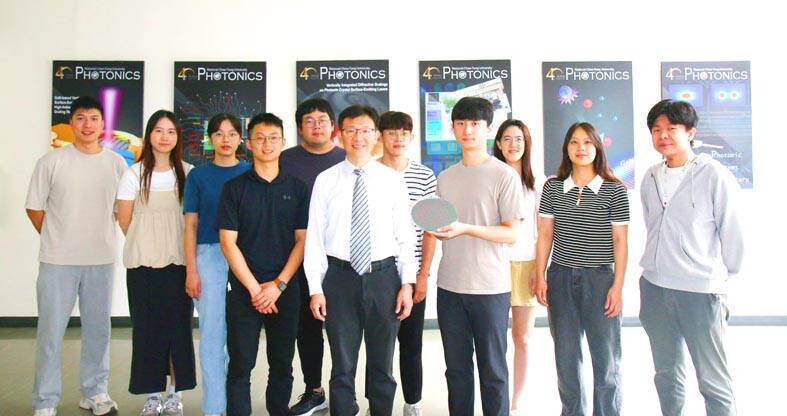Taiwanese researchers have successfully simulated the human brain’s synaptic learning and memory, demonstrating the possibility of simulated synaptic plasticity, which could be used in smart diagnoses, visual modules for self-driving systems, wearable devices or biorobotics.
The research, which appeared in the May issue of the scientific journal Small, was led by National Yang Ming Chiao Tung University Department of Photonics professor Liu Po-tsun (劉柏村).
The research cited recent attention from the scientific community regarding the implementation of neuromorphic devices and their ability to revolutionize computational paradigms by emulating the data transfer mechanisms in biological neural systems.

Photo courtesy of National Yang Ming Chiao Tung University via CNA
The emulation of the “human brain’s computing architecture has ... facilitated the development of neurorobotics and artificial sensory systems, such as self-driving systems and medical diagnostics applications,” Liu said.
The proposed devices successfully emulated key synaptic behaviors, including short-term memory, long-term memory, paired-pulse facilitation and post-tetanic potentiation, he said.
The transistor demonstrates strong potential for emulating the human visual system, he said.
A multilayer perceptron model, employing synaptic weights modulated by 650, 525, and 460nm light in the long-term potentiation region and by electrical stimuli in the long-term depression region, achieves a high recognition accuracy of 87.4 pecent for severely distorted handwritten digits, the report said.
In terms of the device’s capability to recognize handwriting, the research incorporated datasets from the Modified National Institute of Standards and Technology, Liu said.
The tests were run through RGB schemes and incorporated disturbances, such as Gaussian, pepper and salt, and stripe noise, to “emulate real-world conditions and evaluate devices’ performance under image distortions,” the report said.
“By leveraging the high linearity achieved through RGB schemes, the results indicate that under Gaussian noise conditions, the recognition accuracy reached optimal levels, achieving 94.2%, 91.2%, and 91.4% for the R, G, and B schemes, respectively,” it said.
“These findings highlight the robust performance and high accuracy of the proposed WIST synaptic devices in real-world color perception scenarios, demonstrating its feasibility for emulating the human visual system,” it said.
The tests defined devices incorporating a crystalline WO3 (c-WO3) layer as WIST, and those without a c-WO3 layer as IST.
The report concluded that the leveraged simulation method demonstrates the high potential of proposed WIST devices in advanced neuromorphic applications and that the WIST device-based model effectively mimics real-world human visual perception systems.

A Ministry of Foreign Affairs official yesterday said that a delegation that visited China for an APEC meeting did not receive any kind of treatment that downgraded Taiwan’s sovereignty. Department of International Organizations Director-General Jonathan Sun (孫儉元) said that he and a group of ministry officials visited Shenzhen, China, to attend the APEC Informal Senior Officials’ Meeting last month. The trip went “smoothly and safely” for all Taiwanese delegates, as the Chinese side arranged the trip in accordance with long-standing practices, Sun said at the ministry’s weekly briefing. The Taiwanese group did not encounter any political suppression, he said. Sun made the remarks when

PREPAREDNESS: Given the difficulty of importing ammunition during wartime, the Ministry of National Defense said it would prioritize ‘coproduction’ partnerships A newly formed unit of the Marine Corps tasked with land-based security operations has recently replaced its aging, domestically produced rifles with more advanced, US-made M4A1 rifles, a source said yesterday. The unnamed source familiar with the matter said the First Security Battalion of the Marine Corps’ Air Defense and Base Guard Group has replaced its older T65K2 rifles, which have been in service since the late 1980s, with the newly received M4A1s. The source did not say exactly when the upgrade took place or how many M4A1s were issued to the battalion. The confirmation came after Chinese-language media reported

The Taiwanese passport ranked 33rd in a global listing of passports by convenience this month, rising three places from last month’s ranking, but matching its position in January last year. The Henley Passport Index, an international ranking of passports by the number of designations its holder can travel to without a visa, showed that the Taiwan passport enables holders to travel to 139 countries and territories without a visa. Singapore’s passport was ranked the most powerful with visa-free access to 192 destinations out of 227, according to the index published on Tuesday by UK-based migration investment consultancy firm Henley and Partners. Japan’s and

BROAD AGREEMENT: The two are nearing a trade deal to reduce Taiwan’s tariff to 15% and a commitment for TSMC to build five more fabs, a ‘New York Times’ report said Taiwan and the US have reached a broad consensus on a trade deal, the Executive Yuan’s Office of Trade Negotiations said yesterday, after a report said that Washington is set to reduce Taiwan’s tariff rate to 15 percent. The New York Times on Monday reported that the two nations are nearing a trade deal to reduce Taiwan’s tariff rate to 15 percent and commit Taiwan Semiconductor Manufacturing Co (TSMC, 台積電) to building at least five more facilities in the US. “The agreement, which has been under negotiation for months, is being legally scrubbed and could be announced this month,” the paper said,